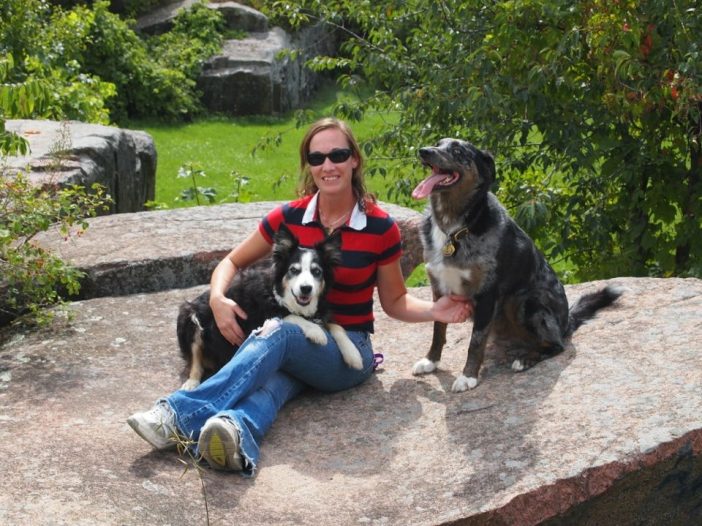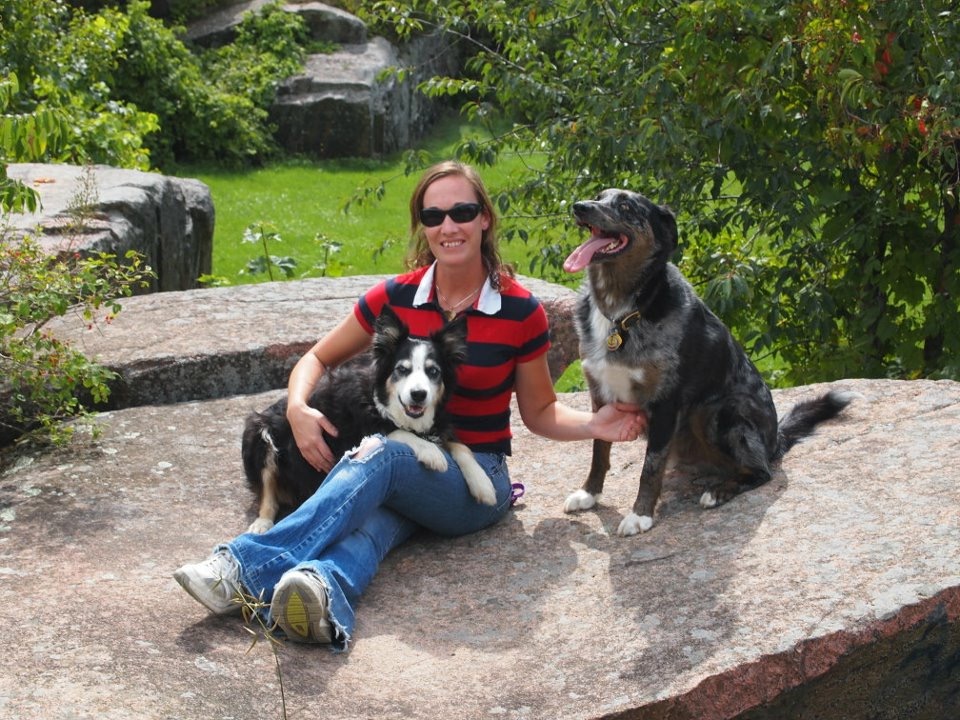
I’ve been working in the veterinary field since I was 15 years old. I witnessed my first euthanasia just two hours into the job. It struck me in that moment, even at my tender age, that this would be the most important aspect of my job. And it is. Saving lives is wonderfully satisfying, and new puppy kisses are amazing, but helping a pet transition through this world is a sacred thing.
I’ve cried alongside pet parents, I’ve laughed at their funny stories, I’ve stood solemnly in the corner out of the way, and I’ve been thankful I was able to lighten the burden of their loss, even if just a little. But despite the countless euthanasias I’ve witnessed and performed, I was ill-prepared for the death of my own pet.
Your first dog as an adult holds a special place in your heart. Mine certainly did. Countless moves, different jobs, different countries, new partners and friends – you flounder through life and they’re with you through it all – your beacon in the storm.
At the age of 16, when renal disease progressed past being manageable my first love my Border Collie, Brae, told me it was time for him to go. I listened. I had countless people supporting me, many words of wisdom, words I’ve even said myself. I had the comfort and support of compassionate family, understanding co-workers and loving friends. Brae left this world surrounded by friends and family under a huge walnut tree on a warm summer day, blanketed in the serenity of our farm. It couldn’t have been more perfect.
But what happens then?
Sometimes the best decisions you will make will also be the hardest.
To say I was devastated by his loss would be a gross understatement. I couldn’t go to work for a week. Please note I said couldn’t. I physically couldn’t face those new puppies, aging seniors or worst of all, pets on the same road he had been on. I was a mess. Although I wasn’t depressed, I was deeply, deeply sad.
Even though I’m not an overly emotional person, the smallest thing would cause rivers of tears. I was fine one moment, and a pile of bawling, snotting jelly the next. I found myself frequently wondering how people get through this. I’d helped people with the process of euthanasia countless times, but the “what now” was uncharted territory.
The world around me was continuing to move, but I had ground to a stop. I bounced back and forth on whether I had made the right decision for him. What if I had waited one more day? What if we had tried something else? I’ve told countless clients over the years that your companion animals tell you when it’s time, and he did. I knew I had made the right decision for him, but that didn’t stop my mind from exploring the possibilities I knew didn’t exist.
Grief is intensely personal.
It took just about two months for me to get my sadness and secret sob-fests under control, crying in the shower is strangely cathartic. That’s not to say I was “over it”, not by a long shot. About six months after Brae had passed, a medication he had been on came up in an exam room and the doctor I was working with asked me what his dose was.
I had to excuse myself and go dab my eyes in the bathroom. How could I be so broken? How could the mere mention of a Zyrtec dose send me spiraling?
Animals, especially dogs and cats, hold such privileged positions in our households. They’re privy to every aspect of our lives. They’re there when you wake up, there when you go to bed, there for every highlight, and every sad time. They have become our constant cheerleaders, our furry therapists. There is nothing as therapeutic as crying or smiling into a furry neck. Studies have shown that for many people the loss of a companion animal often takes a greater emotional toll than the loss of a human family member.
My dogs are so much more than companion animals, they’re like a piece of me, and I know I’m not alone in this thinking. Losing one is like losing a limb.
I had a distinct moment of clarity when a friend (who is now an ex-friend) said to me, “It’s been six months, you need to get over this, he was just a dog.” Harsher words have never been spoken, at least not to me. But this lead me to think, when will I get over this? Will I ever? And he was so much more than just a dog.
Your timeline is yours alone.
It’s been five years since I said goodbye to my boy, and I think I may have the answer as to when my grief will end. Never. I will never get over his loss. True, I don’t openly weep each day, but I do still choke up and get misty-eyed when I think of him, or speak about him sometimes. I’m fairly certain that’s just my new normal, and that’s okay too. It’s no longer a place of deep sorrow, but of quiet smiling introspective and a kind of happy wistfulness. I’ll be honest while writing this I pulled out some photos of him and had a little weep, and it’s been five years. YEARS.
Don’t cry because it’s over, smile because it happened.
His collar still hangs on my car’s rear-view mirror, and his spark will be forever engrained in my heart. With distance, I’m able to focus more on the good times we had, the happy memories, instead of fixating on his loss – and that’s a gift, but it’s also taken time, more than I ever thought it would.
I look back at him now more often with smiles than tears, and his legacy of love lives on in my other dogs. They will never be him, but I love them just a fiercely, all three in very different ways. I’m also able to enjoy each day with my dogs now, instead of focusing on the “what ifs”. As Brae aged, I spent a lot of time wondering about the future, and mourning him before he was even gone. He taught me just to live in the now, to enjoy each day, and not worry about the future.
They say there’s never a love quite like your first love, and I guess that’s true, but that doesn’t mean love doesn’t go on. It does, taking paths you didn’t know existed.
I’ve learned along the way that grief is a deeply personal thing. There is no timeline. There are no right answers. Dogs are such amazing gifts, such unfiltered, unbiased, pure joy. To me, they are love embodied, like tiny points of light. If someone tells you they don’t understand because “it’s just a dog”, please feel free to tell them, from me, that they can’t possibly understand because “they’re just a human.”
My life is so enriched by my three dogs, and the animals I get to interact with each day in my occupation. Sure, it would hurt less to not endure the losses, but my life would be so hollow without them in it.
Losing love is hard. So is allowing yourself to find it again.
A lot of my struggle with Brae’s loss was trying to justify my feelings to the world, if only from inside my head. I know now that I didn’t have to. My loss and my reaction to it were mine alone, they were separate from my husband, my family, and each person I have helped walked down this road.
Some people just won’t understand the pain of your loss, and that’s fine too. Just know that there are people out there who understand. We get it, even if no one else does.
ABOUT THE AUTHOR

Kimberley Beldam-Saylor is a veterinary technician and lifelong equestrian. Kimberley is the Technical Director at Shiloh Veterinary Hospital, a two practice, nine doctor hospital in York, PA and Dover, PA. Originally from Kingston, Ontario, Kimberley now lives in Dover PA with her three dogs (Border collies Vimy and Wynn and Aussie Cross Jelly), and her three Cheval Canadians, Patriote, Xcellence and Wish. A previous FEI level dressage rider/trainer Kimberley now competes in the fast-growing sport of Mounted Archery.